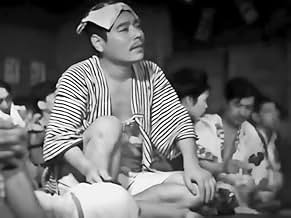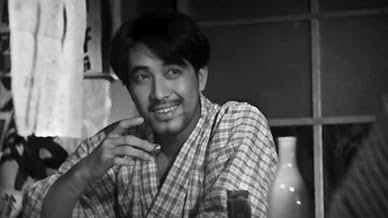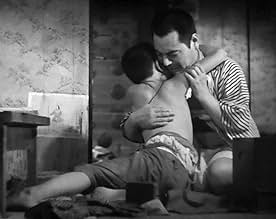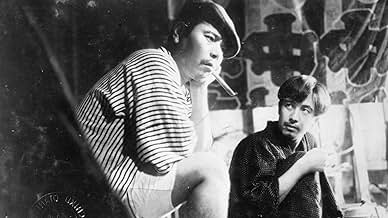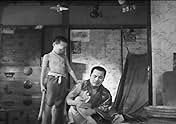AVALIAÇÃO DA IMDb
7,2/10
1,5 mil
SUA AVALIAÇÃO
Adicionar um enredo no seu idiomaTwo Tokyo co-workers come across a destitute young lady in search of a place to live.Two Tokyo co-workers come across a destitute young lady in search of a place to live.Two Tokyo co-workers come across a destitute young lady in search of a place to live.
- Direção
- Roteiristas
- Artistas
- Prêmios
- 1 vitória no total
Den Ôhinata
- Jiro
- (as Den Obinata)
Tomio Aoki
- Tomio
- (as Tokkan Kozô)
Chishû Ryû
- Man on boat
- (não creditado)
Hideo Sugawara
- Boy Taunting Tomio
- (não creditado)
- Direção
- Roteiristas
- Elenco e equipe completos
- Produção, bilheteria e muito mais no IMDbPro
Avaliações em destaque
Another early Ozu where family ties - severely tested but affirmed - steer the world away from havoc and into good. Another early Ozu that documents Japanese society being pushed through the wringer of Western influence, cinematically reflected with Chaplinesque beats: the father is a lazy factory worker and no good man-about-town, in stark contrast to the meek, corporate executive father in I Was Born But.., and once more the stubborn son has to live with the shame.
This go round and in comparison to the above film, the intended seduction of suburban life is less effective. The innocence of childhood is less the fulcrum of discovery of how the world works, and more a counterpoint to ordinary drama; thwarted love, strained friendship, high-minded sacrifice in the end that seduces noble, better persons out of everyone.
Everything turns out the way it does for a reason, the film whimsically asserts. Why is sea water salty? But of course for us to salt salmon with.
It is good and was awarded that year with a Kinema Jumpo beating films by future rivals Mizoguchi and Naruse. I assume it won for the denouement of selfless humanity - inspirationally miraculous and accompanied by fireworks in the sky - that must have echoed desirably at tumultuous times such as those, but there were more interesting things afoot in Japanese cinema of the time.
This go round and in comparison to the above film, the intended seduction of suburban life is less effective. The innocence of childhood is less the fulcrum of discovery of how the world works, and more a counterpoint to ordinary drama; thwarted love, strained friendship, high-minded sacrifice in the end that seduces noble, better persons out of everyone.
Everything turns out the way it does for a reason, the film whimsically asserts. Why is sea water salty? But of course for us to salt salmon with.
It is good and was awarded that year with a Kinema Jumpo beating films by future rivals Mizoguchi and Naruse. I assume it won for the denouement of selfless humanity - inspirationally miraculous and accompanied by fireworks in the sky - that must have echoed desirably at tumultuous times such as those, but there were more interesting things afoot in Japanese cinema of the time.
Yasujiro Ozu is an extremely well respected film director. While not as famous today as his countryman, Kurosawa, among those who are fans of Japanese cinema, he is practically a god. While I have loved many of his films due to their amazing artistry and great direction, I also think that overall, many of his films are a tad overrated. In other words, because SOME films are near-perfect classics (such as both versions of FLOATING WEEDS or my favorite, LATE SPRING), people often tend to see ALL of his films as having the same quality. This is true of all the great directors, as there are a devoted group of followers that see every film as great--even if the films have obvious flaws or were made before the directors learned and perfected their craft.
I mention all this because although PASSING FANCY is a very good film, it's far from great--despite some amazingly positive reviews. While it's true that the Japanese film industry didn't switch to sound until very, very late compared to Western countries, shouldn't this be considered when giving out 10s to these silents? In other words, shouldn't technical merit be considered when reviewing a film? As such, I'd have to knock a point off the film. In addition, the film's plot is amazingly scant and a bit too ordinary.
Now in Ozu's defense, I must say that when it comes to the ordinary, nobody does it better. Here we have the story of a hard-drinking blue collar man and his young son and there's not a lot of excitement or action...but it STILL engages the audience due to his nice touch and excellent acting. In addition, the ending is very sweet and well done--even if nothing is exactly resolved in this story of very mundane individuals.
Well done and worth seeing but not exactly magical.
I mention all this because although PASSING FANCY is a very good film, it's far from great--despite some amazingly positive reviews. While it's true that the Japanese film industry didn't switch to sound until very, very late compared to Western countries, shouldn't this be considered when giving out 10s to these silents? In other words, shouldn't technical merit be considered when reviewing a film? As such, I'd have to knock a point off the film. In addition, the film's plot is amazingly scant and a bit too ordinary.
Now in Ozu's defense, I must say that when it comes to the ordinary, nobody does it better. Here we have the story of a hard-drinking blue collar man and his young son and there's not a lot of excitement or action...but it STILL engages the audience due to his nice touch and excellent acting. In addition, the ending is very sweet and well done--even if nothing is exactly resolved in this story of very mundane individuals.
Well done and worth seeing but not exactly magical.
Ozu has often used the theme of father and son relationships in his films and here he explores a little more besides. Beyond the relationship of Kihachi the father and Tomio the young son you get the widower Kihachi trying to become closer to the pretty, much younger Harue. This silent film speaks volumes about family, about hopes but it is Ozu's light comic touch which makes it another great film of his. It is completely silent but it is compelling, actually a story that could be retold and remade in any corner of the globe. The acting is just about universally good and the film has a lot of heart attached to its sometimes ordinary theme. Then again, Ozu has always made extraordinary out of the ordinary. Here is another example of the master at work.
Ozu tricked me on this one. I read nothing about it before it started, and as the opening act played out, I thought I was getting a romance. Instead, it ended up being a story about a father and his son, a melodrama that effectively works within its box while peeking out beyond its borders to work quite well. It made me think of Woman of Tokyo, the melodrama that simply went too far in my eyes, and it acted as a contrast to something that kept things sedate enough to work more effectively.
Kihachi (Takeshi Sakamoto) and Jiro (Den Obinata) are coworkers in a brewery. Kihachi is illiterate but has a son, Tomio (Tokkan Kozo), who goes to school. After drinking one night, the two men encounter Harue (Nobuko Fushimi), a young woman in need whom they bring to their drinking spot, run by Otome (Chuoko Iida), who gives Harue a job. The opening of the film is about the dueling affections for Harue with Kihachi bending over backwards to make himself palatable to her while the younger Jiro treats her dismissively. The film actually begins with a quote about geishas being both givers and receivers of temporary affection, something I think could have come from Jiro's perspective. There's this distance because he sees her as just selling herself for temporary room and board. It comes back later as well.
But, Kihachi's efforts get rebuffed, and he's angry about it. Partially taking it out on Tomio, Kihachi, in a conversation with Otome, realizes his error and decides to give Tomio a bit of cash to spend on himself, to make himself feel like a millionaire for an afternoon. And this is where the film finds its focus: on the father and son.
Tomio gets sick with some bad candy, to the point of near death, and Kihachi has to face what he actually cherishes. This section takes up a lot of time in the middle of the film, to the point of being most of the rest of the film, and it's done in that typical Ozu way: quiet and heavily reliant on people looking at each other. Kihachi anguishes over Tomio, exchanging little jokes back and forth when he's conscious, and receiving sympathy and whatever help he can get from those around him, mostly Jiro and Harue.
It's these quiet moments that really make Ozu films. He can fill the openings with light comedy of different stripes, to the point where the opening almost feels like a Lubitsch film, but he's always going to return to what obviously came natural to him: the soft, quiet family drama. And this is where the comparison to Woman of Tokyo becomes the most apt, or contrast, I should say. In the earlier film, it's about a character's death and everyone cries obviously and bigly. Here, Tomio gets close to death, and everyone's sedate and reserved in the face of it. It's the stuff of melodrama (a dying child), but it's treated with so much more tact that it ends up working.
And the finale is about making hard choices in the face of a changing circumstances. Jiro took out a large loan to pay for the doctor, and Jiro is going to go work as a laborer in a remote region to pay it back. Can Kihachi just accept that? Can he accept that his son was saved by someone else?
I would applaud the film more for its ending, but it ends up having its cake and eating it at the same time to the point where I don't get the ending. The emotion of the last hour of the film is clear and effective, but then the ending finds a victory that doesn't quite fit. It limits my enjoyment of the melodrama a bit.
But not enough to undo the rest. I feel like the opening is a bit of a sleight of hand, but it's a good trick on Ozu's part (as well as his writer Tadao Ikeda) to establish characters, setting, and a motif that comes back later, giving greater import to a minor characters' actions. It's quite solid storytelling, combining early comedy with later drama. I just wish the ending more fit the film. But, the character of Kihachi apparently became something of a staple for Shochiku Studios as a recurring character. So, even in the 30s, Japanese cinema wasn't afraid of sequels.
Kihachi (Takeshi Sakamoto) and Jiro (Den Obinata) are coworkers in a brewery. Kihachi is illiterate but has a son, Tomio (Tokkan Kozo), who goes to school. After drinking one night, the two men encounter Harue (Nobuko Fushimi), a young woman in need whom they bring to their drinking spot, run by Otome (Chuoko Iida), who gives Harue a job. The opening of the film is about the dueling affections for Harue with Kihachi bending over backwards to make himself palatable to her while the younger Jiro treats her dismissively. The film actually begins with a quote about geishas being both givers and receivers of temporary affection, something I think could have come from Jiro's perspective. There's this distance because he sees her as just selling herself for temporary room and board. It comes back later as well.
But, Kihachi's efforts get rebuffed, and he's angry about it. Partially taking it out on Tomio, Kihachi, in a conversation with Otome, realizes his error and decides to give Tomio a bit of cash to spend on himself, to make himself feel like a millionaire for an afternoon. And this is where the film finds its focus: on the father and son.
Tomio gets sick with some bad candy, to the point of near death, and Kihachi has to face what he actually cherishes. This section takes up a lot of time in the middle of the film, to the point of being most of the rest of the film, and it's done in that typical Ozu way: quiet and heavily reliant on people looking at each other. Kihachi anguishes over Tomio, exchanging little jokes back and forth when he's conscious, and receiving sympathy and whatever help he can get from those around him, mostly Jiro and Harue.
It's these quiet moments that really make Ozu films. He can fill the openings with light comedy of different stripes, to the point where the opening almost feels like a Lubitsch film, but he's always going to return to what obviously came natural to him: the soft, quiet family drama. And this is where the comparison to Woman of Tokyo becomes the most apt, or contrast, I should say. In the earlier film, it's about a character's death and everyone cries obviously and bigly. Here, Tomio gets close to death, and everyone's sedate and reserved in the face of it. It's the stuff of melodrama (a dying child), but it's treated with so much more tact that it ends up working.
And the finale is about making hard choices in the face of a changing circumstances. Jiro took out a large loan to pay for the doctor, and Jiro is going to go work as a laborer in a remote region to pay it back. Can Kihachi just accept that? Can he accept that his son was saved by someone else?
I would applaud the film more for its ending, but it ends up having its cake and eating it at the same time to the point where I don't get the ending. The emotion of the last hour of the film is clear and effective, but then the ending finds a victory that doesn't quite fit. It limits my enjoyment of the melodrama a bit.
But not enough to undo the rest. I feel like the opening is a bit of a sleight of hand, but it's a good trick on Ozu's part (as well as his writer Tadao Ikeda) to establish characters, setting, and a motif that comes back later, giving greater import to a minor characters' actions. It's quite solid storytelling, combining early comedy with later drama. I just wish the ending more fit the film. But, the character of Kihachi apparently became something of a staple for Shochiku Studios as a recurring character. So, even in the 30s, Japanese cinema wasn't afraid of sequels.
Takeshi Sakamoto and Tokan Kozzo team up memorably yet again as an unemployed illiterate drunk and his resentful son, in this sentimental study of working class father-son relationships. As in I WAS BORN BUT... and TOKYO CHORUS, Ozu explores how children measure their self-esteem in their parents.
Você sabia?
- CuriosidadesYasujirô Ozu regular Chishû Ryû has a small role towards the end of the film as a fellow passenger on board a ship, playing an uncredited "Man on Boat".
- Erros de gravaçãoKihachi states that 50 sen to a boy his age (referring to Tomio) is like 10 ryo to him and Otome. The ryo was replaced by the yen in 1871, over 60 years earlier. (The yen replaced the ryo at par; there are 100 sen to the yen.)
However, Otome then says, "No, more like 1,000 yen!" So, it's possible "ryo" was still being used synonymously with "yen" over a half-century later.
- ConexõesFeatured in Transcendental Style and Flatulence (2017)
Principais escolhas
Faça login para avaliar e ver a lista de recomendações personalizadas
Detalhes
- Tempo de duração1 hora 40 minutos
- Cor
- Mixagem de som
- Proporção
- 1.37 : 1
Contribua para esta página
Sugerir uma alteração ou adicionar conteúdo ausente

Principal brecha
By what name was Coração Caprichoso (1933) officially released in Canada in English?
Responda
